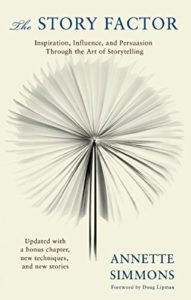 One of my go-to books on STORY and INFLUENCE is The Story Factor by Annette Simmons. First published in 2001, Simmons did a wonderful job pulling together frameworks and practical examples that illustrate how influence happens (or not) through the power of framing (i.e. STORY.)
One of my go-to books on STORY and INFLUENCE is The Story Factor by Annette Simmons. First published in 2001, Simmons did a wonderful job pulling together frameworks and practical examples that illustrate how influence happens (or not) through the power of framing (i.e. STORY.)
It’s really powerful to pull some nuggets from this book during a general election cycle – Think about these points the next time you’re arguing politics with your relatives! (Good luck!)
“A good story helps you influence the interpretation people give to facts. Facts aren’t influential until they mean something to someone. A story delivers a context so that your facts slide into new slots in your listener’s brains. If you don’t give them a new story, they will simply slide new facts to old slots. People already have many stories they tell themselves to interpret their experiences. No matter what your message, they will search their memory banks until they find a story that fits for them.”
“Whenever you tell a story that contradicts someone’s core story they will usually get angry. This is a natural defense. Understanding anger is an important part of telling influential stories… If you choose to tell empowering stories you will encounter anger as people defend their ‘victim stories.’ When a new story demands courage, extra effort, or invalidates past choices, people usually get defensive.”
“Facts don’t have the power to change someone’s story. Their story is more powerful than your facts. As a person of influence, your goal is to introduce a new story that will let your facts in.”
“The beauty of story is its ability to last in memory long after the facts and figures are gone.”
“In the end, the best story wins. Not the right story, not even the most frequently told story, but the story that means the most to the greatest number of people—the one that is remembered. Lawyers know that. In the courtroom, diagrams, passionate language, exhibits, and the art of questioning witnesses are orchestrated to tell the story a lawyer wants told. A storytelling lawyer activates the emotions and senses of a jury and invokes the power of drama to influence the decision. The timing and style of a prosecution attorney walking ‘the murder weapon’ around the room can ignite the fears, horrors, and imaginations of the jury. They may be consciously concerned about the facts, but their subconscious mind is watching that gun and playing a story they imagine might have happened complete with screams, blood, and emotion. If this ‘story’ becomes real enough for them, they will find the facts to fit the story their subconscious already believes.”
This last part is worth summarizing: The best story wins. People will find facts to fit their ‘story.’

